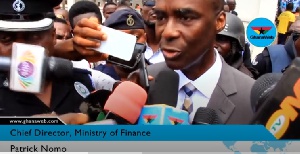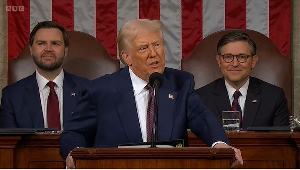The planned presentation of petition by the Vehicle and Assets Dealers Association of Ghana in conjunction with the National Concerned Spare Parts Dealers Association (NCSPDA), True Drivers Union (TDU), Concerned Drivers Association (CDA), and many others to Ken Ofori Atta at the Finance Ministry hit the rocks as the Finance Minister did not show up.
According to leaders of the coalition of petitioners who yearned to have their grievance heard tête-à-tête with the Finance Minister, the development was disappointing and disrespectful.
But according to Patrick Nomo, Chief Director of the Ministry of Finance who received the petition on behalf of Mr. Ofori Atta, the minister had traveled outside the country for an equally important assignment.
“I’m receiving this petition on behalf of the Finance Minister, Ken Ofori Atta. The luxury vehicle tax was submitted to parliament and passed by parliament representing the people of Ghana…. we’ll submit it to the appropriate authorities and it will receive due attention” he said.
Per the petition presented to the various governmental agencies, the coalition says if government would go ahead with the implementation of the policy, it needs to clearly define the vehicles that qualify as luxury vehicles, because not all vehicles with engine capacity of 3.0 and above qualify as luxury vehicles, stressing that the policy is killing their businesses.
Background
The Ghana Revenue Authority (GRA) has said the implementation of the law to levy vehicles with high engine capacities takes effect from Wednesday, 1st August 2018.
Under the new tax regime, vehicles with engine capacity of 3.0 litres and more are required to pay respective levies, the GRA said in a release Monday.
“The Driver and Vehicle Licensing Authority (DVLA) is authorized by the Law to collect the levy on behalf of Government. With effect from Wednesday, 1st August 2018, the levy shall be paid on the registration of vehicles and subsequently on or before the annual renewal of the roadworthy certificate of such vehicles, with engine capacities listed above," GRA stated in the release.
The levy is also imposed on vehicles existing prior to the passage of the Law with the above-listed cubic centimetres.
Also, vehicles whose roadworthiness certificates have already been renewed prior to the passage of this Law in 2018 will pay the levy starting from their next renewal date in 2019.
Meanwhile, the following categories of vehicles are exempt from the levy:
a)tractors;
b) ambulances;
c) commercial vehicles that have the capacity to transport more than ten persons;
d) commercial vehicles for the transport of goods;
e) other exemptions as may be prescribed by the Minister responsible for Finance.

















